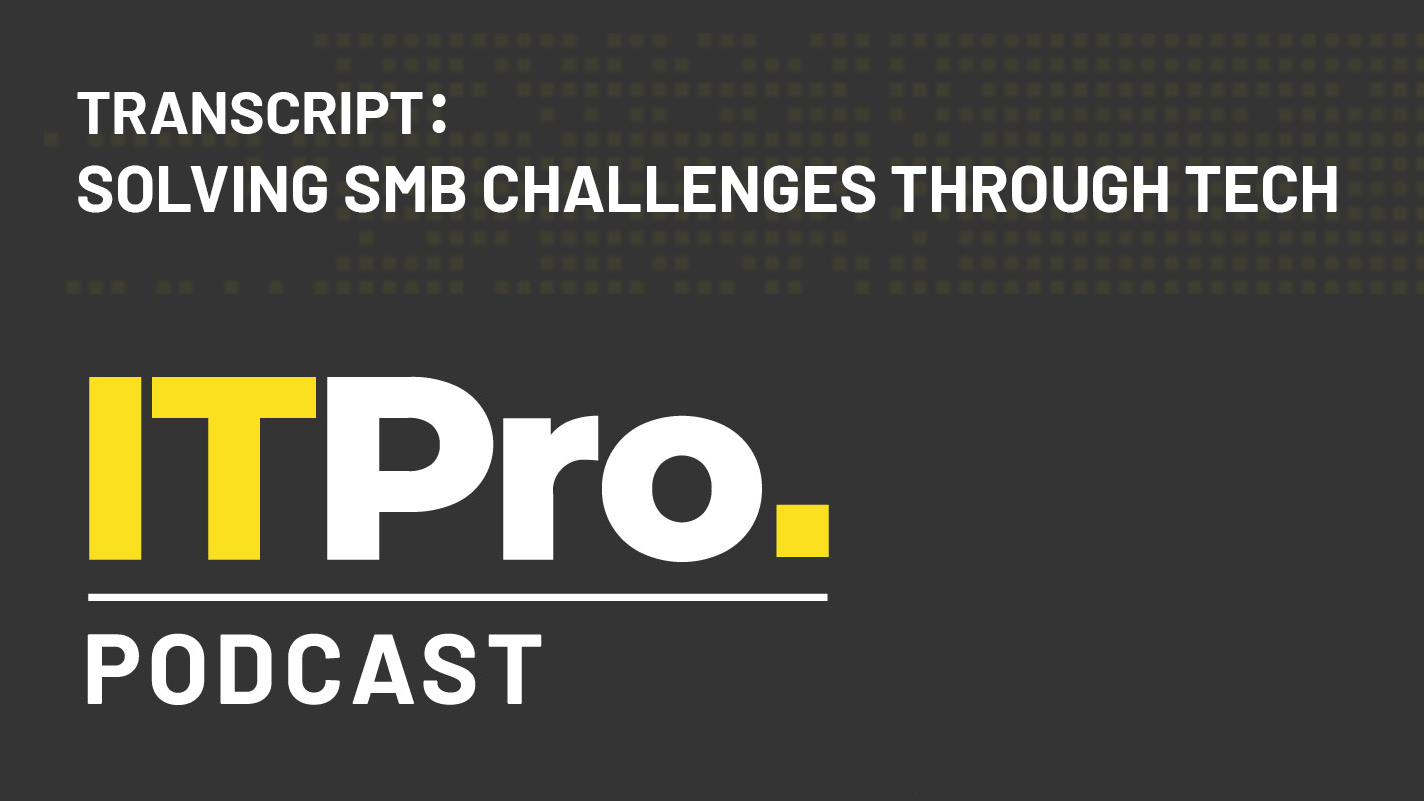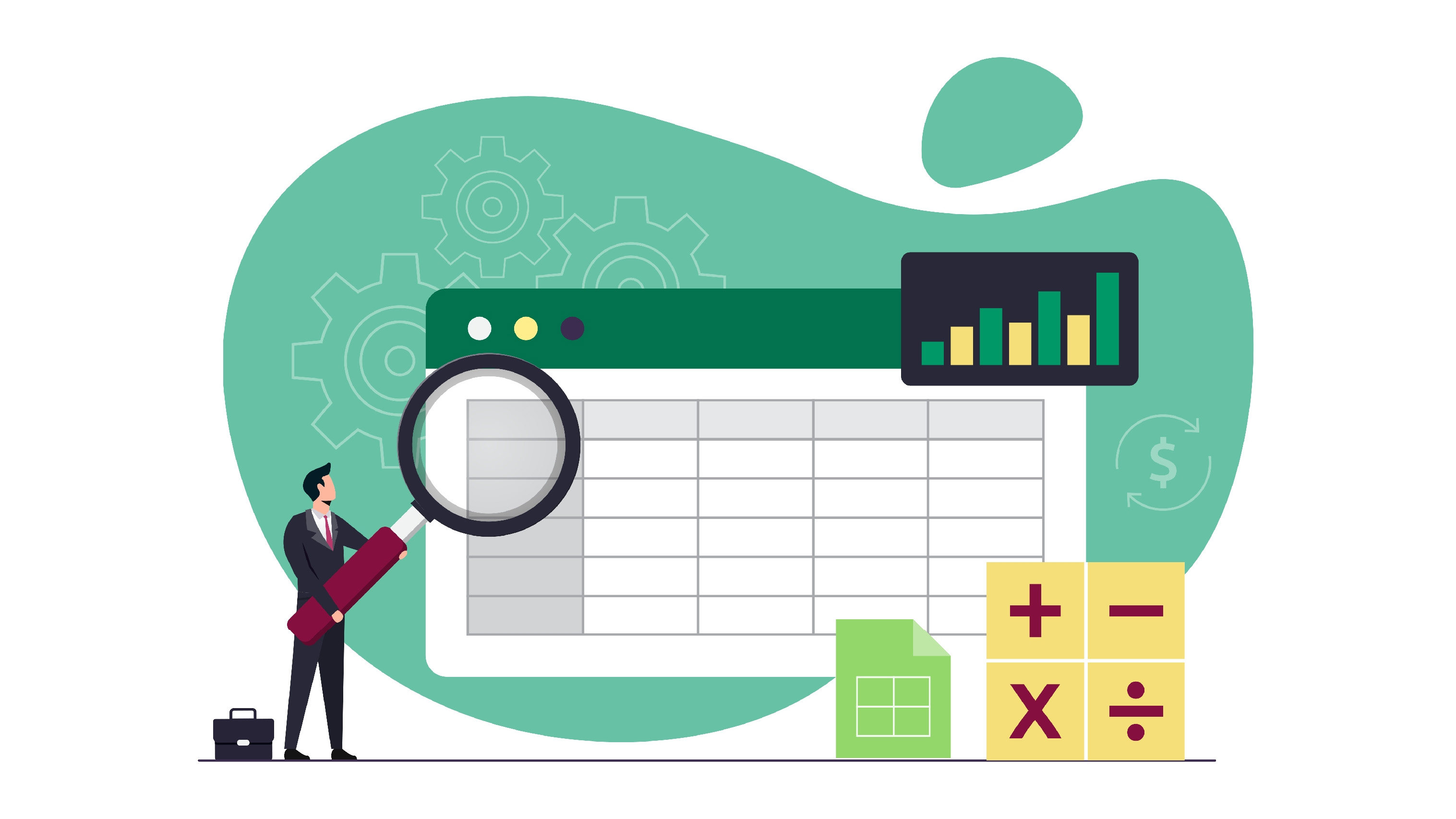
This automatically-generated transcript is taken from the IT Pro Podcast episode ‘Solving SMB challenges through tech'. To listen to the full episode, click here. We apologise for any errors.
Hugh Armitage
Hi, I'm Hugh Armitage.
Adam Shepherd
And I'm Adam Shepherd.
Hugh
And you're listening to the IT Pro Podcast. This week we're taking a look at small businesses.
Adam
The life of a small business is full of challenges. But it's fair to say that the last several years have been more challenging than most, from Brexit to the pandemic SMBs have been forced to deal with a number of radical changes to the market as a whole, as well as the tools and processes they rely on to do business.
Hugh
This week, we're looking at how these changes have affected small businesses in the UK, and how technology has helped them to respond. We're joined by Aaron Harris, CTO of UK based cloud financial software platform Sage, to find out more about how its customers have reacted to the disruptions of the last several years, and how they can future proof their business to weather similar challenges to come.
Adam
Aaron, good to have you with us.
Sign up today and you will receive a free copy of our Future Focus 2025 report - the leading guidance on AI, cybersecurity and other IT challenges as per 700+ senior executives
Aaron Harris
Great to be here. Thanks for inviting me.
Adam
So Sage has a strong focus on small business; to kick off with, can you tell us a little bit about how the UK SMB landscape has changed over the last three years?
Aaron
Yeah, and I think you you said it, the last three years have been seen accelerating change. I know this word is probably overused. But unprecedented. is a good word for it. Perfect storm might might be a good word for it. You know, the way, the way I talk about this, essentially, is that that technology was accelerating change for small businesses anyway. And COVID brought about an additional level of acceleration beyond what was already happening. So you know, there's a number of changes I think that we can talk about. The first one and obviously, the one where we're quite focused is just the acceleration of digital transformation. With with with COVID, businesses quickly had to to realise that if they couldn't use their business applications from home, if they weren't able to take orders from their customers digitally, if they weren't able to interact with their banks digitally, right, it became difficult to impossible for them to, you know, to to operate successfully and efficiently as a business. So So digital transformation for sure is, is you know, the biggest I think change that we see. But there's there's quite a bit more to it. The COVID also drove quite a change in the way we we hire retain, recruit, make happy work, colleagues, employees. There's a there's a huge labour shortage right now. And it's not quite clear how when, when all of this settles, what the the normal mode of work is going to be? How much of it's in-office, how much of it is work from home? How much do we expect our employees to work locally to the office versus how much do we allow them to work remotely? So we've got we've got digital transformation, we've got, you know, a tightening and sort of hard to predict labour market. And on top of that, we've got inflation, which, you know, nobody's got a crystal ball to say, you know, when when will inflation start to level? Is it still going up? Is it still going down? How does that affect my business? You know, should I raise my prices? So the punchline for all of that is that small businesses are expecting technology providers like Sage, to help them right to make sense of this and to to navigate through these times. So we saw, for example, that 44% of SMBs in the UK, expect to invest more in technology over the next 12 months than they have previously. So clearly, small businesses see technology as a big part of the solution to all this change.
Hugh
So Aaron, you've outlined some of these sort of key issues that we're dealing with, but um, can you dive a bit deeper into the consequences of, of those for SMEs?
Aaron
Sure, I guess it's it's helpful to start with digital transformation. And digital transformation is one of those, I think, very overused terms. It caught on, you know, six or seven years ago, people didn't really pay a lot of attention to what it really meant. And I think the big misunderstanding is that digital transformation is not simply moving from analogue technology to digital technology. It's not simply being able to move your technology from on premise to the cloud. It's it's really rethinking your your business model. It's, it's rethinking the key workflows of your business, as I mentioned, how do customers discover and buy my products? You know, how do I most effectively purchase from my suppliers? And how do I manage a supply chain, that that relies on digital workflows versus analogue workflows. So one of the big consequences, therefore, is the need to really rethink the business models that small and medium sized businesses operate against, and not just automate today's tasks, but actually, you know, automate complete, completely new digital workflows, right, that that reflect this more digital world. There's another element to this that we think is quite important, which is that as business processes become increasingly digital, it's quite disruptive to the work of humans. I use the word human there very specifically, because it's kind of the opposite of artificial intelligence, which is one of the technologies that's really enabling this transformation of workflows. And so there has to be this level of trust between, you know, small business owners, finance teams, accounting teams, that as they transition more and more of their work to technology, that technology is going to do the work in the right way. That where AI is being used to make decisions, it's making the right decisions. But it also means that we can use technology to support humans and what they're good at right? Things that AI will never be good at; leveraging human relationships, making decisions that require an understanding of a complex set of circumstances. They're having empathy and understanding the bigger picture that that decision is, may have beyond just the financial results of the business. So getting this psychology, right, this trust, if you will, between humans and technology, as as we accelerate this digital transformation is really, really important.
Adam
Yeah, that's a really good point, Aaron, and one of I think the most challenging aspects for small businesses is grappling with a lot of this new technology and trying to apply it to their business in a way that makes sense for them without having to essentially reinvent how they how they work on a kind of operational level, particularly, I think, for small businesses that don't necessarily have a huge amount of technical proficiency or expertise in the business already, that can sometimes be a challenge. So what are the kind of some of the main factors that can allow businesses to take advantage of these technologies without having to enormously invest in advanced kind of development operations or hiring a bunch more IT personnel?
Aaron
That's a great question. And actually, you know, I think the the burden the responsibility is on us, right? It's, it's on the providers of this technology. There's a there's an evolution that we're watching here, as we as we progress from computing era to computing era. If you remember the progression from the on premise, client, server, PC, desktop computing era to to the cloud. Part of the big transformation, there was that small and medium sized businesses no longer needed to worry about installing the software, setting up the servers, configuring the servers, managing the upgrade processes, so much of the responsibility that would have been the responsibility of these small and medium businesses, is handed over to the to the technology company, which which you know, requires a level of trust, for sure. We're moving into to another era that I think is marked by this this acceleration of digital transformation. That's that's changing business models. And we need to see that same progression. That progression, where less and less of the responsibility for managing the tech is the responsibility of the customer. And more and more of the responsibility lies with the vendor. Part of what makes this era of computing, I think, really different. Goes back to one of our principles at Sage for how we create technology leadership, and it's going to sound a bit ironic coming from a CTO. But the first principle of our strategy to become a technology to be a technology leader is that user experience, customer journey, is now more important than technology. Right? So in other words, the decision making process has to tie exactly to what are the needs? What's the journey? What's the experience of ultimately, the end customer and the users? If you get that right, technology will naturally follow. If you do it exceptionally well, the technology sort of recedes into the background.
Hugh
So Aaron, we've talked about these challenges that SMBs are facing, and how well equipped are UK small and medium businesses to meet them?
Aaron
Well, I think one of the things that really proved out during the COVID pandemic was that small businesses are remarkably resilient. It's, there's, there's a special entrepreneurial spirit that lives within small and medium businesses, especially small businesses, where they're, you know, there's always an entrepreneur who started this business, who is betting more than just their livelihood on this business, right, it becomes sort of essential to their, their personal outcomes in life, we've learned that small businesses are incredibly resilient. That's not to say that they're indestructible. You know, there's, there's much we have to do to protect small businesses. And we've seen support come from governments, right, we've seen advances in technology. So we can't just leave them on their own to survive. But I would say that small businesses are incredibly resilient and adaptable. I think that the pandemic changed some of our of our values, I think, and how we build business. Prior to the pandemic, this idea of, you know, lean manufacturing, lean supply chains, you know, never having any inventory on hand was was, you know, key to the way you build a profitable business. Well, now as we as we move into an era, it's not just COVID that's causing uncertainty, there's there's a lot of factors in the world, driving uncertainty, resilience becomes a really important objective in the way we design our businesses and design our workflows. And as I said, small businesses are well equipped. Governments play a role. So I think this is also really important. In this era of digital transformation, much of that digital transformation will be derived from AI, which which requires data inputs. So data flows in, you train machine learning models, that then automates human decision making, but also data just in a standardised way. So one of the things that has really impaired small businesses in the UK is their inability to access the credit markets. Right. So we know that small businesses are a bit disadvantaged versus larger businesses, because they don't have the same maturity of processes, they don't have the same maturity of being able to create a set of data that helps a creditor to make a credit decision. So governments have a lot that they can contribute to help small businesses to thrive. In this era, it's it's not just providing government support. It's not just programmes like like help to grow. It's also driving standards like open banking, open finance. And as much as the the, you know, the citizens of the United Kingdom probably are not thrilled about making tax digital. One of the things making tax digital does is it drives an accelerated digital transformation of these finance processes. And it creates a standard of uniformity. That allows for quicker decision making. So I've gotten a bit into, you know, our small businesses equipped, yes, but the answer is they are. But technology providers like Sage and and governments can't just rely on the fact that these companies are really, really resilient.
Hugh
Do you think government policies going in the right direction in general?
Aaron
I think so. It's it's a bit of a mixed bag. So governments often don't get it right the first time. Their intentions are almost always good. What I'm starting to see is is that governments are learning and pivoting a bit in their efforts. So where governments help is in driving that standardisation, where they help is in supporting small businesses and their efforts to to digitally transform. So in general, governments are helping. One of the things that is I can't see the future yet on is that the geopolitics in the world are actually not driving globalisation, they're driving more local, local approaches to data, local approaches to privacy, to sort of the digital processes. And a big challenge in the future that may offset some of the progress that governments like the UK Government are making is unfortunately, the sort of de globalisation, right, the idea that governments want to control where data resides. Governments have different regulations around data ownership rights, and data privacy rights, governments will have different thoughts and requirements around the approach to digitising processes like invoicing and filing taxes. So mixed bag, but I think generally as governments drive standardisation, as they support digital transformation, they are moving things in the right direction.
Adam
So Aaron, you mentioned earlier the importance of being able to access credit for SMBs and to easily access the kind of information that they need to get that credit. How much has the growing need for digital transformation affected SMBs' investment roadmaps, if you're like, how much extra investments are they having to make in their technology stack compared to what it would have been, say, three to five years ago?
Aaron
Yeah, that's a great question. And I'm going to get I'm gonna get on one of my favourite soap boxes to answer that question. So going back to this progression of technology from the desktop era, to the cloud era, now to the digital era, you know, more and more of the responsibility for managing the technology shifted to to the vendor. What's also happening in this progression is changing business models. So we know that with software as a service, which was the dominant approach to to selling software in the cloud era, we went from perpetual licence as a business model to subscriptions. As a business model, it had, among other things, a nice impact on democratising the access to technology, it meant that company like Salesforce, for example, and even - I should, I should use Sage in these example - Sage, right, in the in the creation of these cloud native SaaS products, when you go to a subscription model, the the way you monetize the value shifts such that you can expand access, right, it's less expensive for small business to pay because they have fewer licences. They require fewer licences, it's more expensive for larger companies, because they need more licences. Well, now what's happening with the digitization of finance and accounting workflows, is we're starting to see activity based pricing or consumption based pricing, becoming a very popular way to to support commercial business models. So it's not just as a small business that I only need, you know, one licence or two licences, because I only have one person in finance, I don't need licences anymore as a way to pay for the value I receive, I pay for value as I use the software. So as I transact over digital networks, as I make payments, as I file my taxes, and so this sliding scale of how customers pay for technology becomes even closer to the growth and the scale of the business. This is something that we've got a lot of work to do, not just with with sage, but other technology providers to enabling this sort of a business model. But But that's what's going to enable even the smallest businesses to access solutions that a couple decades ago, only the largest corporations could access. And I would also I guess, go back to what I said before, that in this era of digital transformation, technology follows design. So if we're designing the software to be easy to implement, not only for medium and large businesses, but for small businesses, you also take away a lot of that upfront risk and cost associated with the implementation of the software. So it's all about this evolution of business model. It's all about this evolution of of experience design and customer journey design.
Hugh
What other technologies can help SMBs overcome these challenges?
Aaron
Well, I've mentioned AI, and I can talk about AI all day long. So you know, we can have a great conversation about AI. The technology that that we are really investing in right now is what we call the digital network. So the the idea behind the digital network is that as business workflows digitally transform, it means that software must be designed now not only for the business that sort of executes those workflows, but also for all of the participants in the workflow. So if I have a workflow associated with the way that I pay my suppliers, it's not sufficient to design the software just for me as as the buyer of those services, it's got to span the relationship between me and my supplier. Same thing with customers, right? So if the way I invoice is digital, how does my customer access their invoice digitally? How do they pay that invoice digitally? So the idea of the digital network is that it creates a global map of all of these business relationships. And that enables us to create digital services that digitise the workflows that span those relationships. What it also does is it enables us to sort of aggregate the data that's flowing across the business ecosystem, to enable us to do much more powerful machine learning. So the example is, you know, we know that it's actually pretty high proportion, I think it's over one full percent of the invoices that run through one of our products in the UK, are from Amazon business; it's a staggering amount. So if if we were to build an AI capability for our customers, that spots potential fraud, so imagine somebody fakes an Amazon invoice, changes the remittance information and manages to get that to a small business; if I'm constrained to learn only from the interactions with Amazon for that one business, my models aren't going to be very smart, right? Models are only as smart as the data they used to train them. So a network allows us to aggregate all these data flows, to do much more intelligent to create much more intelligent AI capabilities. And you can apply it across all kinds of things, you can apply it to, to, you know, predicting fulfilment times, across suppliers. Now, I want to be very, very clear here, that all of this depends on our having a trusted relationship with our customers. We recognise fundamentally that we don't own the data, our customers own the data. And so long as they trust us to leverage that data in a way that helps them to be more successful, we're going to maintain that trust, right, as long as we're clear on the principles that we operate by, will maintain that trust. But it's an incredibly powerful concept. Once you create these networks for both data and connectivity. These networks also support things like blockchain, they that's a more conducive way of doing crypto transactions, one of the things that we're really excited about is the opportunity to create smart transactions or smart contracts sorry, on a network so that you know when an invoice is issued by a customer, as soon as that the the order is fulfilled, the payment is automatically executed. The accounting treatment of all of these activities are automatically created. So this network architecture becomes the foundation to unlock AI ML, to unlock blockchain related capabilities, to unlock crypto and smart contracts. So that's, you can hopefully you can tell from the way that I'm talking that I'm quite passionate about this. This is the next big evolution, getting all of this connected into networks is what's going to unlock the next generation of innovation.
Adam
So we've we've talked a fair amount about some of the technologies that are being implemented, kind of, if you like behind the scenes, in terms of some of the services that SMBs are using, kind of in the course of their day to day business. But what about the technologies that are being if you'd like more proactively deployed in terms of some of the things that SMBs will be looking to expand into as they grow? Particularly when you're starting with a kind of very, very small operation, as you start to scale, what are the first things that should be on a small businesses shopping list in terms of really maximising the benefit that they can get out of their investment in technology?
Aaron
So again, great question. Traditionally, as a small business grows, there's only a handful of events, or milestones that trigger that small business to make their first investment in technology. One is simply their ability to accurately and efficiently invoice their customers. Another event would be if if you have a heavy dependence on supply chain or on subcontractors or consultants, your ability to manage those relationships and to, again, accurately and efficiently pay your suppliers. It could be that you have compliance requirements that you've experienced before, you've scaled to the point where you need technology to automate your supplier relationships and your customer relationships. But it tends to be one of these events that triggers that sort of first investment in technology. I think there are a few new areas in in this digital, you know, this era of digital transformation. One of those is, you know, digital go to market capabilities. So how do I market, sell and get paid for my services is going to be, you know, I think for many companies a very early milestone that they reach, because, you know, starting a brick and mortar store, starting a brick and mortar business is just you know, it's going to be less and less pervasive in the future. And I think we're starting to see some more disruption in the space that may trigger small businesses to adopt technology sooner. And I want to sort of caveat this by saying we're in the extreme high point of the hype cycle here. But the metaverse, you know, there, there will be small businesses who decide that actually a storefront that exists in a Metaverse because I know who my customers are. My product is more more conducive to being sold in the metaverse or it creates, you know, a unique experience in the metaverse. Small businesses may choose to adopt technology simply so that they can create a storefront in the metaverse.
Adam
I just want to pick up on that because that's something that that we've heard a lot about, as you mentioned, there's a lot of hype around the metaverse at the moment. Do you think that the metaverse is going to be something that, you know, a significant proportion of small businesses are going to be able to extract value from?
Aaron
So I don't have a crystal ball. It's hard to say how this is going to play out. But But one thing I do have a lot of conviction. And this I know I keep going back to this but but it's sort of you know, it gets back to the disruption that each progression of technology era introduces. With, you know, the advent of the cloud, we create a completely new ways to buy and sell products with the Internet. Right. Amazon exists because of the disruption of the cloud and it became a new commercial model, and a new way to buy things. I believe that there will equally be as much disruption in the way we buy and sell products and services with the metaverse. You know, it's sort of this blending of the physical and the digital world where you've got the ability to do the transaction with all the benefits of digital workflows. But you also get the benefit some of the benefits of of the physical nature of having a much richer interaction with the products that you're evaluating, much richer interactions with with the store that's behind the products where you can converse in the metaverse so I believe, very firmly that we will see markets emerge in the metaverse that are as disruptive as the markets that emerged in the cloud. What I can't see yet is how it's going to emerge. Will will Facebook, you know succeed in in their vision to be the metaverse company? Will there be multiple metaverses? Will be there some other Metaverse that wins? It's hard to say yet. So I'm not suggesting that small businesses need to get on their horse and get out there and spend lots of money. What I'm suggesting is that it's coming and as we start to see how it starts to shake out, I think it'll become an important event in a small businesses growth. Deciding now's the time to start, you know, a digital sales approach, digital customer interactions, digital support, digital services through the metaverse.
Hugh
How can small businesses best prepare themselves to handle future disruptions?
Aaron
So I think it goes back to this this notion that we're shifting our business models away from you know, lean efficient, maximise every penny of profits to workflows that are more agile, if you will, more more adaptable; workflows that are that are more resilient to change. I think small businesses are going to have to embrace this idea that there's multiple channels for small businesses to sell their products now. And they've got to have the ability to quickly pivot between them as circumstances changes. Small businesses need to embrace that the workforce is changing. You know, gig workers are going to be a huge part of this economy. So being able to adapt the jobs, the tasks within our business, to line up with the right style of worker, whether it's a full time salaried employee, all the way to to a gig worker that has is very it's variable. It's more agile. I think that's that's really important. And I'm not just saying this, because I'm, I'm representing Sage. But implementing technologies is going to be super critical. Let me give you an example on this whole work workforce concept. I didn't mention this as part of the answer. It's not just that the labour market is tighter now. It's that the it's very difficult to predict because it's not just businesses that are sort of in this this era of instability. It's humankind, right. So when we when we set out to use AI to build some capabilities for our HR customers, our human resources customers, we thought that what small businesses would want was AI that would predict when an employee would churn. And I think that's really representative of the era that we're leaving, where you had very stable workforces. And you know, what you needed to do is to be able to plan appropriately. What we learned was that actually small businesses wanted AI to help them with their short term staffing. Could could we use AI to predict absenteeism among their staff? Can we use AI to predict availability of staff, as we have to dynamically adjust schedules and capacity on a on a very short cycle? So adopting technology, you know, like what we've built with AI that predicts absenteeism will be pretty critical, I think, to enabling agile businesses that that ultimately are going to succeed in this this era of digital transformation.
Adam
Well, on that note, I'm afraid we're going to have to leave this week's discussion there, but I'd like to thank Sage's CTO, Aaron Harris for joining us.
Aaron
Thanks for having me, it was a real pleasure to talk with you both.
Hugh
You can find links to all the topics we've spoken about today in the show notes and even more on our website at itpro.co.uk.
Adam
You can also follow us on social media as well as subscribe to our daily newsletter.
Hugh
Don't forget to subscribe to the IT Pro Podcast wherever you find podcasts. And if you're enjoying the show, leave us a rating and review.
Adam
We'll be back next week with more analysis from the world of it but until then, goodbye!
Hugh
Bye.
ITPro is a global business technology website providing the latest news, analysis, and business insight for IT decision-makers. Whether it's cyber security, cloud computing, IT infrastructure, or business strategy, we aim to equip leaders with the data they need to make informed IT investments.
For regular updates delivered to your inbox and social feeds, be sure to sign up to our daily newsletter and follow on us LinkedIn and Twitter.
-
 Nationwide forges closer ties with AWS in cloud transformation push
Nationwide forges closer ties with AWS in cloud transformation pushNews The building society is “consolidating and modernizing” cloud infrastructure and focusing heavily on internal skills development
-
 Finance and security leaders are odds over cyber priorities, and it’s harming enterprises
Finance and security leaders are odds over cyber priorities, and it’s harming enterprisesNews Poor relations between the departments can be solved by CISOs talking in a language CFOs understand
-
 How SMBs can DIY their IT implementation and support
How SMBs can DIY their IT implementation and supportFeature For some small and medium-sized businesses, the third-party expertise and support might be out of reach. What’s the alternative?
-
 How AI is reshaping the role of spreadsheets in accounting
How AI is reshaping the role of spreadsheets in accountingIndustry insights Modernizing spreadsheets can enable secure and AI-ready accounting and finance functions
-
 Implementation and atychiphobia: helping SMEs overcome fear
Implementation and atychiphobia: helping SMEs overcome fearIndustry Insights Fear of failure stalls SME system upgrades, but resellers can calm concerns and build confidence
-
 Small businesses are ‘flying blind’ on carbon emissions and struggling to meet sustainability goals – and the blame lies with big tech vendors
Small businesses are ‘flying blind’ on carbon emissions and struggling to meet sustainability goals – and the blame lies with big tech vendorsNews Research from Wasabi shows small businesses are struggling to keep track of carbon emissions, and a key factor lies in the poor reporting from tech vendors.
-
 ‘The opportunity ahead is immense’: Kaseya’s new CEO eyes SMB gains and closer ties with partners
‘The opportunity ahead is immense’: Kaseya’s new CEO eyes SMB gains and closer ties with partnersNews The former Intuit leadership veteran will spearhead Kaseya’s next phase of customer-centric growth
-
 HSBC says get back to the office or risk bonuses – and history shows it’s a tactic that might backfire
HSBC says get back to the office or risk bonuses – and history shows it’s a tactic that might backfireNews HSBC is the latest in a string of financial services firms hoping to tempt workers back to the office.



